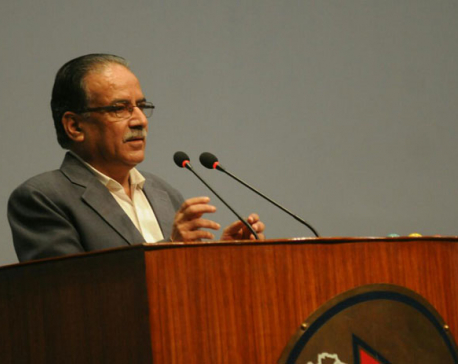
OR
Investment Summit
As Arun Jaitley, the Indian Minister of Finance, put it in his keynote speech at the Nepal Investment Summit 2017, Nepal holds “tremendous potential” as a destination for foreign investment. He flagged energy, agriculture, tourism, irrigation and transport as areas that can steer Nepal on the path of sustainable economic development. There is no faulting what he said. But having a potential and realizing it are different things. Nepal might hold the most fancy investment summits it likes, and many times a year at that, but they will come to nothing unless we also work to create conducive business climate here. Currently, Nepal occupies 107th position of the 190 countries surveyed on the World Bank’s (ease of) Doing Business Index, down from 100th position in 2016. In other words, despite all of Nepal’s recent gimmicks to attract quality international investors, it is getting harder for them to come and invest in Nepal. This is because it is still devilishly hard for foreign investors to enforce contracts (for instance, in the absence of a court dedicated solely to hearing commercial cases) or even to get enough electricity to run their operations in Nepal. Construction permits are also particularly hard to enforce in Nepal.
All this goes to show that when our political leaders, from across the political spectrum, commit to together work for the country’s development, they are not being entirely honest. For instance, even at the investment summit, the leaders of all three big parties—Nepali Congress, CPN-UML and CPN (Maoist Center)—committed that they would never obstruct Nepal’s economic development. But each of these political parties has in the past imposed crippling bandas and strikes on the beleaguered country, decimating the business climate. It is also thanks to the power-centric politics of the leaders of these parties that there have been 15 governments in Nepal in the past 17 years.
Political instability is a big put-off for international investors. So there is no reason for the likes of Jaitley or the chief of Asian Infrastructure Investment Bank (AIIB), Jin Liqun, both of whom were present at the investment summit, to trust our political actors. The only way they will impress international investors is through their work, not empty words.
For instance a clear message of intent can be sent to the international community if the Nepali state successfully holds the three sets of elections by the January, 2018 deadline. And when a new government is then formed, there will be constitutional measures in place to ensure its continuity for at least for a couple of years. But the political actors will contribute most if they, through their action, delink economic issues from political ones. Let at least the three major parties come with a common economic plan that will be followed irrespective of which parties are in the government. If that is not possible, at least let a government serve out its full term, to see its economic plan through. Nepal’s development prospects have long been held hostage to its internecine politics. Our prospects will continue to be dim so long as the status quoist mindset of our political actors does not change.
You May Like This

Promises made, promises delayed: Khotang sans textbooks in English
KHOTANG, April 17: While the new academic session has already begun across the country, textbooks in English language are yet... Read More...

New India coach Ravi Shastri promises more freedom for players
NEW DELHI, July 13: New India cricket coach Ravi Shastri plans to adopt a more hands-off approach to the role than... Read More...

A more pragmatic Dahal's second PM innings more successful
KATHMANDU, May 25: Many had doubts about Pushpa Kamal Dahal when he assumed the office of prime minister for the second... Read More...

Just In
- World Malaria Day: Foreign returnees more susceptible to the vector-borne disease
- MoEST seeks EC’s help in identifying teachers linked to political parties
- 70 community and national forests affected by fire in Parbat till Wednesday
- NEPSE loses 3.24 points, while daily turnover inclines to Rs 2.36 billion
- Pak Embassy awards scholarships to 180 Nepali students
- President Paudel approves mobilization of army personnel for by-elections security
- Bhajang and Ilam by-elections: 69 polling stations classified as ‘highly sensitive’
- Karnali CM Kandel secures vote of confidence


















Leave A Comment